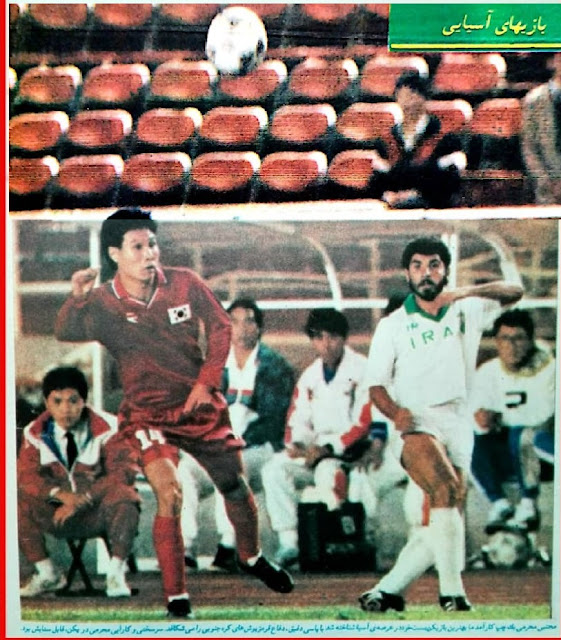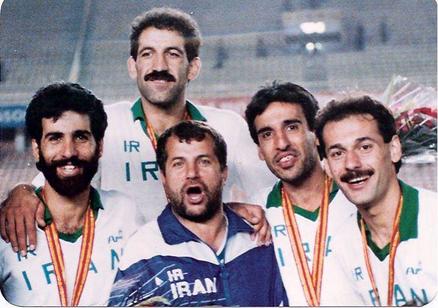Following the failure to advance in the World Cup qualifiers, Monajati was replaced with Parvin who would coach both club and country. Parvin spent the remainder of 1989 on exploring different formations and experimenting with players. He tested his team and gained mixed results with games in the Peace and Friendship Cup and also the series of friendlies played during the 22 Bahman festivities. By 1990 though, Parvin had a pretty good idea as who to pick and who to drop, some of which raised a few eyebrows. Early on, the heroic Iranian goalkeeper, Abedzadeh, was dropped from the team as Parvin declared his intentions of making Saeed Azizian his number one keeper. Also Mohsen Garousi, the joint top scorer of the qualifiers, and Morteza Fonoonizadeh, a steady defender for years, were cut. On the other hand, many of the previously resigned players were brought back. Panjali, Naser Mohammadkhani, Derakhshan, Ahadi, and Shahin and Shahrokh Bayani were recalled to the team along with the relatively younger goalkeeper Behzad Gholampour, and Samad Marfavi who once again had recaptured his scoring touch in the domestic league. In preparation for the Asian Games the national team tied Ireland’s club team St. Patrick 0-0, and then defeated Poland’s B team twice, 3-0 and 1-0. The games against St. Patrick also marked the return of Abedzadeh after some indifferent performances by Azizian. With such results and experimentations, Iran arrived in China to open against Malaysia in a group also featuring North Korea.
The
game against an inferior Malaysian opponent started pretty shaky.
A quick play by the Malaysians early on ended up with a cross from the left which was hammered down. Only a cat-like reflex save by Abedzadeh prevented Malaysia from taking the lead. However it was only a matter of time for Iran to strike. A foray into the offensive third by Moharrami and a pinpoint pass to Pious enabled him to score the first goal. He would nearly add a second shortly afterwards by chipping the keeper although a Malaysian defender would clear the ball at the last moment. In the second half Ghayeghran would send a perfect lob forward for Pious who would bury his hot in the opposite corner. A run in to the box and ultimate shot by Marfavi was parried away by the keeper only for the rebound to fall to Pious for him to complete his hattrick and hand Iran a 3-0 win.
Malaysia did Iran a favor by tying North Korea and thus ensuring advancement for Iran. While with even a loss Iran still could finish second in the group, however, a tie would ensure both teams of advancing and thus neither team played with too much fire.
Late In the second half, Parvin made a substitution and brought in Namjoo Motlagh for Kermani Moghaddam and things opened up from that point on. A cross from the right by Namjoo Motlagh, the same kind of crosses that Pious had been begging for all game long, perfectly found the head of Pious and he made no mistake in putting it away to give Iran a short-lived lead. Later in a moment of confusion outside of the box, a Korean player pounced on a through-ball, forced his way through two defenders and unleashed a shot from inside the box that Abedzadeh could only watch as it kissed the back of the net. The game seemed to be heading for a tie until Shahrokh Bayani made a solo run from midfield and unleashed a thunderous shot that found the upper corner and gave Iran a 2-1 win and first place in the group.
The next opponent in the quarterfinals would be Japan.
The Japanese squad was one very familiar to Iran as they had faced one another in the 1986 Asian Games, the 1988 Asian Championship and in a friendly in Azadi Stadium. While the Japanese were nowhere near the caliber of play that they achieved in the late 90s, but they were still a formidable opponent. The match was played rather evenly with chances for both teams but it was Iran going ahead in the first half. A cross from the right by Shahrokh Bayani met with Marfavi’s dive and chipping header. The ball looped perfectly over the Japanese keeper’s desperate dive to give Iran the 1-0 lead. Marfavi nearly scored again although his close range shot was cleared off of the line. Throughout the rest of the game there were more chances for both teams but Marfavi’s goal would be the only one thus sending the Japanese packing and paving Iran’s way to the semifinals to face South Korea.
The game against South Korea began very cautiously, with Parvin only fielding one forward (Pious).
Like its previous games, Korea was on the attack from the very beginning, but could not penetrate the many layers of defense that it faced. The few times that it did, Abedzadeh was there to thwart their attacks. In spite of this Pious would come close to scoring for Iran with his shot going just over the bar.
While the game in itself was not a rough one, but in an unfortunate incident Abtahi cracked open the head of the Korean star player, Kim Joo Song.
Also in a moment of absentmindedness, Moharrami intercepted a harmless ball in midfield with an intentional handball thus earning himself a yellow card and suspension from the next game. As the game progressed Iran became more adventurous and towards the end of the game began attacking in their regular style of play. The game ended 0-0 in regulation. It was in overtime that following a cleared corner, Moharrami launched a ball into the Korean box as the defenders were pushing up. Ghayeghran’s perfectly timed run kept him onside as he collected the ball on his chest (although Mehdi Fonoonizadeh was behind the last defender but he cleverly stepped out of bounds behind the endline so as to not be part of the play). Before the onrushing keeper could react Ghayeghran chipped the ball over his head and into the empty net.
The Koreans almost immediately equalized off of a corner kick although Moharrami saved the ball on the line and Abedzadeh cleared it. The remaining minutes of overtime would yield nothing (in spite of the Korean keeper pushing up in Iran's half and taking throw-ins) as Korea’s onslaught picked up pace but in the end they would have to be satisfied with fighting for third place as Iran advanced to the finals to once again face North Korea.
Given that Iran had already once defeated North Korea, it seemed as though there would be no problems this time around. In defense Ansarifar took over the position of the suspended Moharrami.
Perhaps a bit of overconfidence had taken over, or maybe North Korea was just playing stronger, but while Iran were never in serious danger of giving up a goal, however they also never managed to create anything too significant on the other end. Iran was presented with a golden opportunity in the second half when a Korean defender took too long in taking a throw-in and received a yellow card. It might have stayed at that had the Iranian players not surrounded the ref and reminded him that the player already had a yellow. After checking his notes the referee realized his mistake and whipped out the red for Iran to continue the match with an extra player. But even this would prove fruitless as they still could find no way of repeating the earlier victory over the Koreans.
After 120 minutes of scoreless play, both teams had to settle for penalty kicks. Much like two years ago in the Asian Championship against China, Abedzadeh once again came up big and managed to save two out of the three Korean shots. Ghayeghran, Eftekhari and Ansarifar scored the first three Iranian attempts and when Namjoo Motlagh nailed his shot, Iran was crowned as champions.
Iran
roster: Abedzadeh, Gholampour, Zarrincheh, Moharrami, Panjali, Shahin Bayani, Hasanzadeh,
Nader Mohammadkhani, Mehdi Fonoonizadeh, Ghayeghran, Kermani Moghaddam,
Shahrokh Bayani, Abtahi, Ashouri, Eftekhari, Namjoo Motlagh, Ansarifar,
Marfavi, Naser Mohammadkhani, Pious. Coach: Parvin













%20Iran-Japan%201990.jpg)































No comments:
Post a Comment